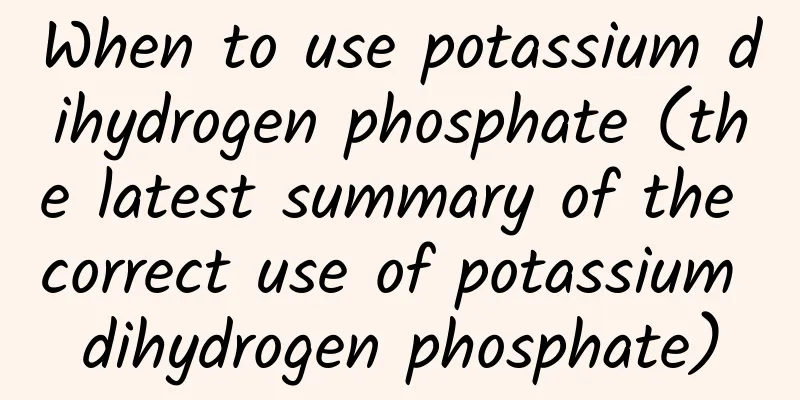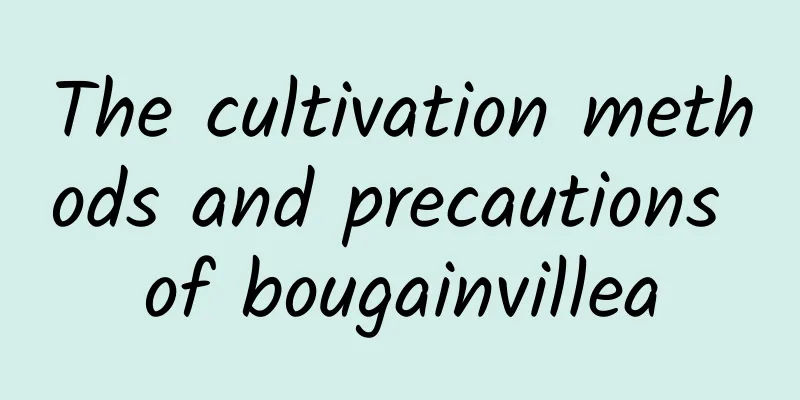When to use potassium dihydrogen phosphate (the latest summary of the correct use of potassium dihydrogen phosphate)

|
Potassium dihydrogen phosphate is a commonly used fertilizer in agriculture. It has the effects of promoting crop flower bud differentiation, fruit swelling and color change, rooting and seedling strengthening, and disease resistance and stress resistance. It is widely used. As a phosphorus and potassium fertilizer, potassium dihydrogen phosphate only contains two major elements: phosphorus and potassium. The phosphorus element has the functions of promoting crop rooting and flower bud differentiation, providing energy for fruit enlargement, and promoting seed formation. Potassium can increase the activity of enzymes in plants, promote photosynthesis, make fruits bigger and more colorful, and enhance disease and drought resistance. Therefore, high-quality potassium dihydrogen phosphate can improve the yield, quality and marketability of crops overall. It can be used for a variety of crops and is also widely used in flower cultivation. There are two ways to apply potassium dihydrogen phosphate: foliar spray and root fertilization. When is it necessary to spray potassium dihydrogen phosphate?Although potassium dihydrogen phosphate is good, it cannot be used in all situations. When applying this fertilizer, you need to pay attention to the following issues: 1. Do not use too much in the early stage of crop growth. In the early stage of crop growth, the main growth is roots, stems and leaves, and the demand is mainly nitrogen fertilizer. The demand for phosphorus and potassium fertilizers is relatively small. If potassium dihydrogen phosphate is applied excessively, it will inhibit the growth of crop stems and leaves. 2. Be careful not to apply fertilizer at too high a concentration. If the concentration of potassium dihydrogen phosphate is too high, it may cause fertilizer damage and "leaf burn" on crops. Wheat, rice and other crops of the Gramineae family have strong tolerance and can be sprayed at 300-500 times the concentration. For other leafy vegetables, flowers, etc., it is recommended to spray at a concentration of 500-800 times. 3. Potassium dihydrogen phosphate cannot be mixed with free trace elements. Sugar alcohol trace elements need to be prepared and used immediately. Farmers may have discovered during the use of potassium dihydrogen phosphate that if potassium dihydrogen phosphate is mixed with products containing calcium, magnesium, zinc, iron, and manganese, precipitation will occur. This is because free metal ions will react chemically with phosphate ions to produce flocculants and precipitation, affecting the effectiveness of fertilizers and pesticides. Calcium fertilizers and trace fertilizers in a sugar alcohol state are easily decomposed when exposed to light or high temperature. The trace elements become free ionic states and may also produce flocculent precipitation. Therefore, it is recommended to prepare them for immediate use and not to store them for a long time. 4. It cannot be mixed with alkaline pesticides or fertilizers. Potassium dihydrogen phosphate is a slightly acidic fertilizer. If it is mixed with alkaline fertilizers and pesticides, a chemical reaction will occur, resulting in abnormal chemical reactions such as flocculation, precipitation, discoloration, heat, and bubble generation , which will cause the fertilizer and drug effects to lose. Mancozeb, metalaxyl, mancozeb, copper hydroxide, basic copper sulfate, calcium copper sulfate, Bordeaux mixture, cuprous oxide, and copper chelate in pesticides cannot be mixed with potassium dihydrogen phosphate. 5. Potassium dihydrogen phosphate is a quick-acting fertilizer, suitable for top dressing, and cannot be used as base fertilizer. Fertilizer products with good water solubility are also easy to infiltrate with water and be lost a lot, so the fertilizer effect period is short and cannot be used as long-term base fertilizer. |
<<: The main role and function of trace element fertilizer (what are trace element fertilizers)
Recommend
How to grow bougainvillea
1. Watering During the maintenance period, the so...
When is the right time to plant autumn cucumbers?
Best time to plant autumn cucumbers Autumn cucumb...
Can lilies be planted in the ground?
Can lilies be planted in the ground? Lilies are m...
Asparagus fern, the best in Feng Shui home decoration
Placing asparagus fern in front of the door is go...
How to deal with curled and wrinkled pepper leaves?
Every midsummer, leaves in pepper fields often cu...
The growing environment and local conditions of cherries
Cherry growth environment and conditions Cherries...
When do forget-me-nots bloom?
Forget-me-not flowering period The flowering peri...
How to repot potted irises and how often should you repot them?
1. Repotting method 1. Time selection: There are ...
How to repot and prune Phalaenopsis
Reasons for repotting: The life span of a single ...
Is it suitable to use a large or small pot for Christmas cactus?
Is it suitable to use a large or small pot for Ch...
What does mint do?
1. Cool down and relieve summer heat Mint is good...
Spring Horse Beheading Method
1. Prepare tools Before beheading the spring ju, ...
Reasons why hydrangeas don’t bloom
1. Increase lighting 1. Reason: Hydrangea likes a...
How to grow Sedum sphenanthera so that it will overflow the pot
How long does it take to burst? Sphenantheraea aq...
What to do if the green radish is limp and how to save it
1. Reasons 1. Lack of light: Pothos is a plant th...









